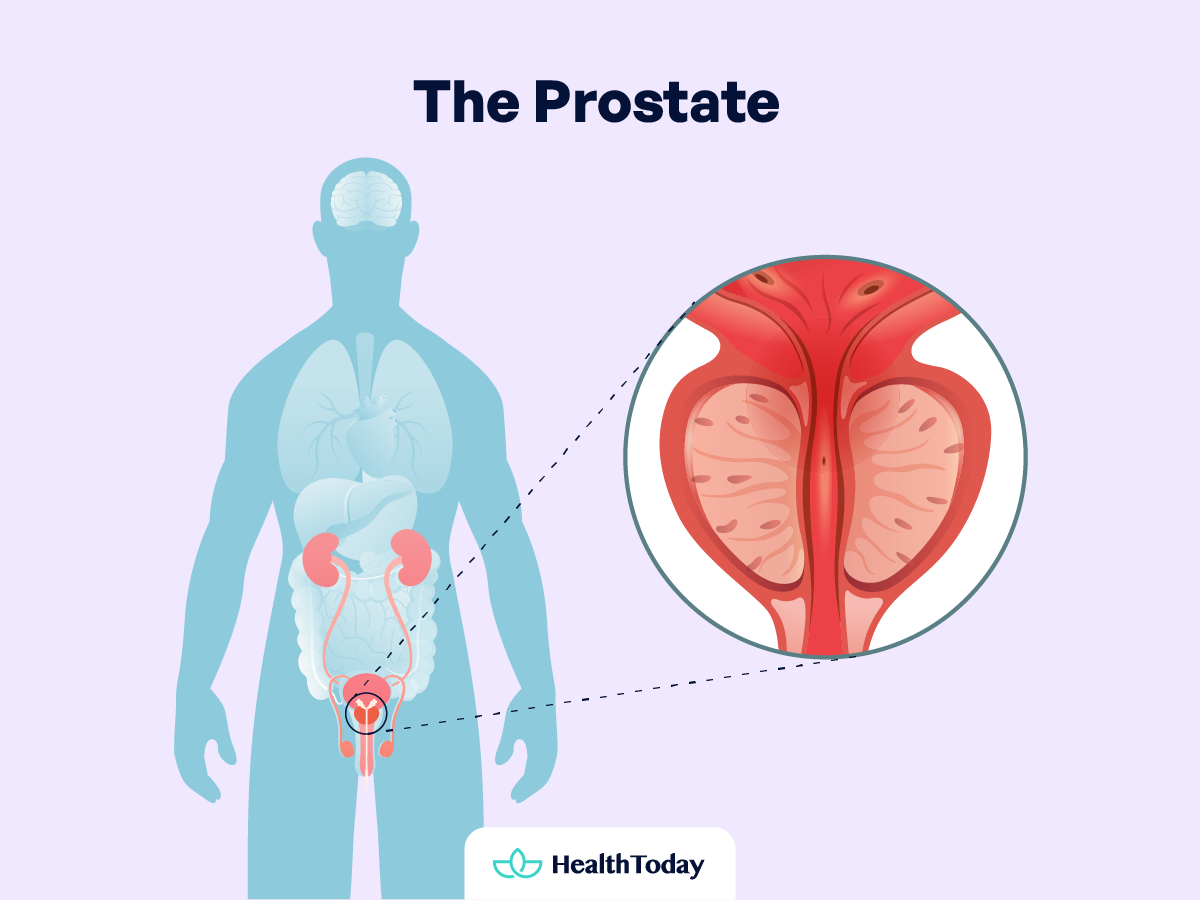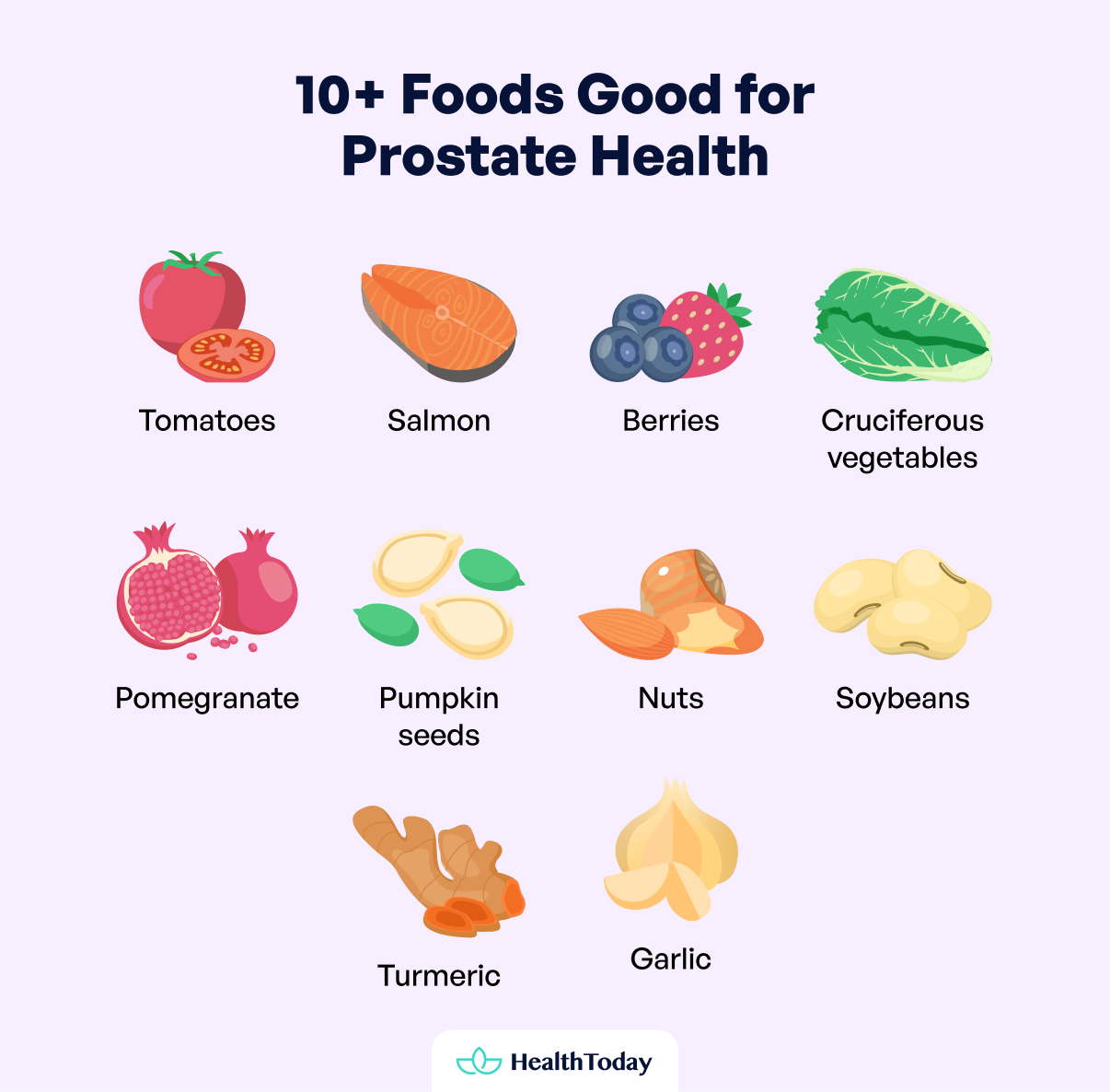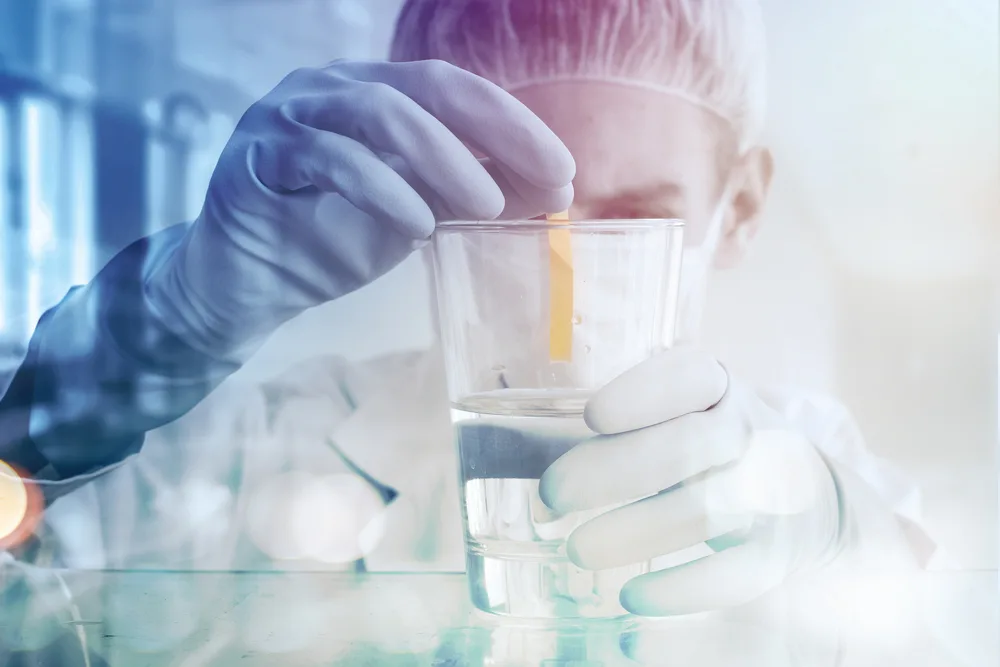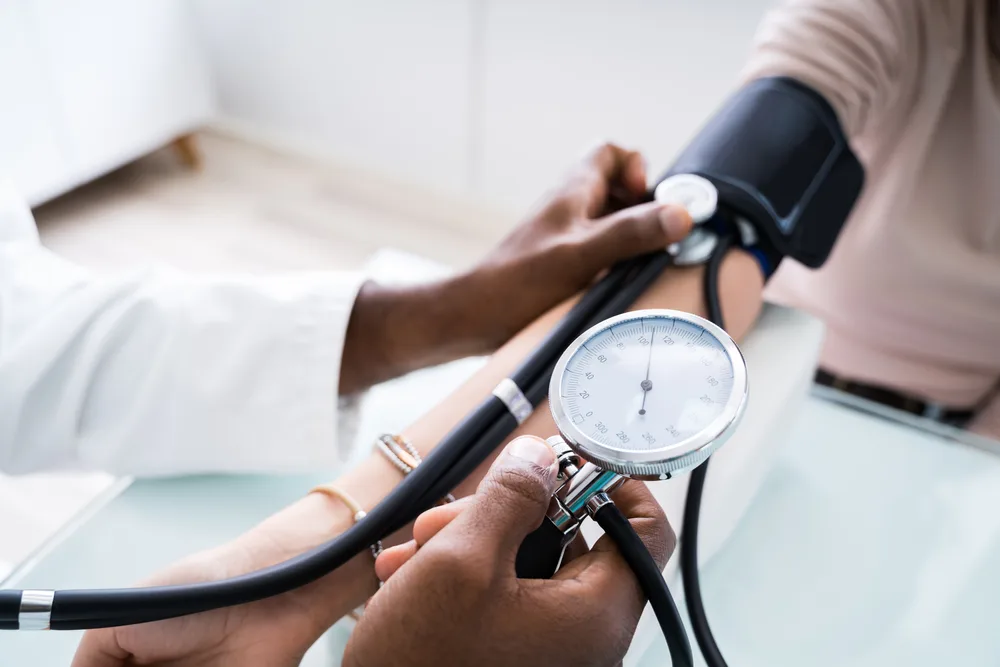Table of Contents
Did you know that 1 in 8 men will be diagnosed with prostate cancer in their lifetime? (1) The prostate is a small gland situated in the male reproductive system. It produces seminal fluid and helps control urination. That is why keeping it healthy is vital to avoid problems like cancer. However, diet is one of the factors that may help maintain prostate health.
Let’s explore foods good for prostate health, what to avoid, and how to manage problems associated with the prostate.
What is the prostate?
Before we study foods good for prostate health, let’s understand what the prostate is.
The prostate is present below the bladder and in front of the rectum in men. It surrounds the urethra, the tube that carries urine and semen out of the body (2).

Anatomy and function
The prostate is a chestnut-sized organ with a doughnut-like shape. It consists of several lobes, surrounded by a capsule of tissue (3).
The prostate’s primary function is to produce a fluid called semen that nourishes and protects sperm cells as they travel out of the body. Furthermore, it helps in the production of hormones and regulates urination.
Common prostate problems
As men get older, testosterone levels decline, along with changes in estrogen, thyroid hormones, insulin, and cortisol. Alterations in prostate function can become evident, which can affect urinary and reproductive functioning, as well as overall health. The prostate can develop the following health issues:
Benign Prostatic Hyperplasia (BPH): Also known as an enlarged prostate, BPH is a non-cancerous growth of the prostate gland (4). This swelling can put pressure on the urethra, making it difficult to urinate.
Prostatitis: It is the inflammation of the prostate, often caused by a bacterial infection (5). Symptoms can include pelvic pain, trouble urinating, and dysfunction in reproductive health.
Prostate cancer: This is due to the uncontrolled growth of cells in the prostate gland. Prostate cancer is the second most common cancer in men (6). When detected early, it is often treatable.
Why may good food contribute to a healthy prostate?
Moving towards understanding the connection between good food and a healthy prostate. Though diet alone cannot prevent or cure prostate problems, certain foods are good for prostate health. The nutrients and compounds found in these foods can help in several ways, including:
- Providing antioxidants
- Reducing inflammation
- Supporting detoxification, ridding the body of harmful toxins
- Supporting gut and hormonal balance
According to a 2020 study published in the journal Nutrients, people who eat fruits, vegetables, fish, nuts, and soybeans have a lower risk of prostate cancer (7). On the other hand, people consuming cakes, pastries, pies, ice cream, and carbonated soft drinks are more at risk of developing prostate cancer.
Additionally, research based on the data from the National Health and Nutrition Examination Survey (NHANES) reported that a high plant-based diet intake can also lower the levels of prostate-specific antigen (PSA) in the body (8). PSA is a protein present in the prostate gland. High levels of PSA may indicate prostate problems and prostate cancer.
10+ foods good for prostate health
As discussed earlier, a diet rich in specific foods can support prostate health. Here’s a detailed look at the best foods and drinks for prostate health.

Best foods for prostate health
Patricia Kolesa, MS, RDN, founder of Dietitian Dish LLC, says that “a healthy prostate diet includes a variety of whole grains, fruits, vegetables, lean and plant-based proteins, along with monounsaturated fats. However, it is always best to seek out a registered dietitian or nutritionist for personalized nutrition advice, as there is never a one-size-fits-all when it comes to diet and nutrition.”
Generally, some of the best foods for prostate health are listed below:
Fruits & vegetables
Cruciferous vegetables like cauliflower, cabbage, and broccoli are rich in nutrients like carotenoids, vitamins K, E, and C, antioxidants, and minerals like calcium, potassium, and selenium. All these nutrients play a role in preserving prostate health. A meta-analysis indicates a possible 4.5 percent decrease in prostate cancer risk with a daily intake of 15 g of cruciferous vegetables (9).
Furthermore, fruits, particularly those high in antioxidants, isoflavones, and vitamin C, such as berries and citrus, protect your body from cellular damage and promote prostate health. Patricia Kolesa, MS, RDN, adds that “antioxidants play a role in reducing the risk of several cancers by reducing the number of free radicals (molecules that damage cells) in the body.”
She says, “You can add more antioxidants to your diet by increasing your intake of fruits and vegetables. Fruits containing high levels of antioxidants include blueberries, raspberries, strawberries, oranges, and kiwi. Vegetables like sweet potatoes, bell peppers, avocados, and leafy greens can be a great addition to your diet as well.”
Additionally, if we talk about the foods that lower PSA levels, some emerging studies have explored potential associations between antioxidant intake and PSA levels (10, 11, 12). However, very few to no studies have discovered associations. Higher-level studies are needed to confirm current associations and findings.
High-fiber foods
Eating high-fiber foods also reduces the risk of developing prostate cancer (13). According to Patricia Kolesa, MS, RDN, “Increasing your intake of fiber decreases the risk of many types of cancer and other chronic diseases, including prostate problems. She recommends fiber intake of 35g/day for an average male.”
And what are the sources of fiber? She says, “Fiber comes from the skin and peels of many fruits and vegetables, as well as whole grains in whole wheat pasta, whole wheat bread, oats, quinoa, and brown rice.
Beans and legumes like black beans, chickpeas, navy beans, and green peas are also great sources of fiber; a ½ cup of beans contains at least 8 grams. You can also find fiber in nuts and seeds like peanuts, pistachios, almonds, and walnuts.”
Healthy fats
Healthy fats, such as omega-3 fatty acids, are also important for prostate health.
Patricia Kolesa, MS, RDN, says, “Omega 3’s are another under-consumed nutrient in the diet that reduces prostate cancer risk. Eicosapentaenoic Acid (EPA) and Docosahexaenoic Acid (DHA), the two omega-3 fatty acids, reduce prostate cancer risk by almost 40 percent.
You can find them in fatty fish like salmon, trout, herring, and sardines. They are also abundant in tofu, edamame, walnuts, and chia seeds.”

Low-sodium options
A low-sodium diet benefits overall health, including the prostate. A study on Chinese adults showed that increased sodium intake is related to a high risk of developing prostatitis-like symptoms (14).
Foods high in sodium often include processed foods, like ham and bacon, canned soups, and frozen meals. Even foods that don’t taste salty, such as breads and certain dairy products like cottage cheese, can have a high sodium content. So, to support prostate health, it’s advisable to choose fresh, whole foods and be mindful of sodium content when selecting packaged items.
Herbs and spices
Many herbs and spices, such as ginger and turmeric, help reduce inflammation and can be included in a prostate-friendly diet. Research shows that curcumin, a compound present in turmeric, is beneficial in relieving enlarged prostate (15).
Best drinks for prostate health
In addition to these foods, certain drinks can also support prostate health. Some of them are as follows:
Green tea: Known for its antioxidant properties, green tea improves prostate health and prevents prostate cancer (16).
Pomegranate juice: This juice is rich in antioxidants and may positively impact prostate health (17).
Filtered Water: Adequate hydration is crucial for all aspects of health, including the prostate.
Coffee: High consumption of coffee can also lower the risk of prostate cancer. Based on a meta-analysis, 1 cup of coffee daily reduces prostate cancer risk by 1 percent (18).






Foods good for an enlarged prostate
An enlarged prostate can be a source of discomfort, but incorporating certain foods into your diet can help manage the symptoms. Patricia Kolesa, MS, RDN, says that eating more plant-based foods is beneficial for an enlarged prostate.
Here’s a list of foods that help prostate hyperplasia:
1. Tomatoes
Tomatoes are rich in lycopene, a powerful antioxidant. It is a staple in the fight against prostate enlargement. However, research shows that the body absorbs lycopene more readily when tomatoes are cooked rather than raw (19, 20).
Eating cooked tomatoes can support prostate health and may be effective for an enlarged prostate. You can add them to your diet in dishes like sauces or soups.
2. Salmon
Salmon and other cold-water fish are rich in healthy fats like omega-3 fatty acids, which reduce inflammation. This helps prevent and relieve BPH symptoms caused by inflammation in the prostate gland (21). Eating fatty fish once a day can reduce the risk of enlarged prostate and prostate cancer as well (22).
3. Berries
Berries like blueberries and cranberries contain antioxidants and anti-inflammatory compounds that may benefit prostate health. Research shows that cranberry consumption can also lower the levels of PSA (prostate-specific antigen) in people with prostate cancer (23).
Similarly, Brazilian berry extract reduces inflammation and prevents prostate cancer (24). Incorporating berries into your diet a few times per week can support prostate function.
4. Cruciferous vegetables
Vegetables like cabbage, broccoli, and cauliflower also contain glucosinolates. These are sulfur-containing compounds that give cruciferous vegetables their slightly bitter taste.
When you chop or chew these vegetables, glucosinolates break down into other compounds, including sulforaphane. Researchers believe that sulforaphane targets cancer cells in the prostate and maintains its health (25, 26). Including these vegetables in your diet may also offer protective benefits against prostate enlargement.
5. Pomegranate
Packed with antioxidants, pomegranates can also help maintain a healthy prostate. Research shows that pomegranate fruit peel and juice have anti-cancer effects. Polyphenols present in pomegranate help fight against prostate cancer (27). Furthermore, certain bioactive compounds reduce inflammation in the body and treat an enlarged prostate (28).
6. Pumpkin seeds
Pumpkin seeds contain zinc, which balances hormones like testosterone and DHT (dihydrotestosterone) linked to prostate enlargement (29). So, pumpkin seeds might be a great addition to the diet for prostate health.
According to a randomized controlled trial, pumpkin seed oil alleviates the symptoms associated with an enlarged prostate with zero side effects (30). However, further research is recommended.
7. Nuts
Nuts like almonds, walnuts, and Brazil nuts provide essential fats and minerals that benefit overall health. A worldwide population-based study showed that consuming nuts protects against prostate problems and cancer (31).
For example, walnuts are packed with alpha-linolenic acid (ALA), a type of omega-3 fatty acid that may reduce inflammation and slow the growth of prostate cancer cells (32).
8. Soybeans
Soybeans and soy products like tofu and miso contain isoflavones, which are plant compounds that may decrease prostate gland inflammation and inhibit cancer cell growth (33). This is why adding soy products to your diet is good for prostate health.
9. Turmeric
Turmeric contains a compound called curcumin, which helps decrease inflammation in the body. The anti-inflammatory and anti-cancer properties of curcumin make turmeric a good choice for treating enlarged prostate (34).
10. Garlic
Garlic contains compounds like allicin, diallyl disulfide, and s-allylcysteine. These compounds may help reduce inflammation in the prostate gland and protect against prostate cancer. Research suggests that people who consume more garlic may have a lower risk of developing prostate cancer (35). However, further studies are needed to confirm this association.






Diet for prostate cancer
Prostate cancer mainly affects older men, with the risk increasing after the age of 50 (36). Certain factors, such as family history, ethnicity, and age, can increase the likelihood of developing prostate cancer, in addition to environmental and lifestyle factors.
While prostate cancer can be aggressive, many cases are slow-growing and may not cause significant symptoms or impact life expectancy. However, diet might play a role in protecting against prostate cancer. Several foods fight prostate cancer with their anti-oxidative and anti-cancer effects.
Is it true that bananas can fight prostate cancer?
While bananas are a nutritious fruit, rich in potassium and other vitamins, there is no conclusive evidence that they can fight prostate cancer (37). However, they are part of a healthy diet and can support overall health, which may contribute to cancer prevention and recovery during treatments like radiation or hormone therapy.
Best foods to fight prostate cancer
Patricia Kolesa, MS, RDN, suggests prostate cancer risk is reduced by opting for more plant-based proteins such as:
- Soy-containing foods (tofu and edamame)
- Nuts and seeds (walnuts, almonds, peanuts, pistachios, chia seeds and hemp seeds)
- Fruits that are particularly high in antioxidants (strawberries, watermelon, and cherries)
- Cruciferous vegetables (broccoli and cauliflower)
Furthermore, beneficial foods to prevent prostate cancer and fight against it are similar to those recommended above for enlarged prostate.
Foods not to eat for your prostate health
Just as certain foods can support prostate health, some foods can also result in prostate problems.
Here are some foods to limit or avoid:
1. Processed and red meat
Processed meats like hot dogs and sausages contain high sodium levels and preservatives. Furthermore, they contain certain cancer-causing compounds like HCAs (heterocyclic amines) formed during cooking at high temperatures. This results in an increased risk of prostate cancer and other problems. Based on a meta-analysis of 12 prospective cohort studies, consuming 50g of processed meat per day may raise the risk of prostate cancer by 4 percent (38).
Also, consume red meats, such as beef, lamb, and pork, in moderation, as they also raise the prostate cancer risk.
2. High-fat dairy products
The intake of high-saturated fat dairy products, such as whole milk, cheese, and butter, may also increase the risk of prostate problems (39). Aim to choose dairy low in saturated fat and with the simplest, cleanest ingredients. Dairy alternatives such as almond milk or yogurt may also be a good option.
3. Refined carbohydrates and added sugars
Diets high in sugar result in inflammation, which may be a risk factor for prostate problems. Drinking sugar-sweetened beverages 250 mL/day can increase the risk of prostate cancer by 10 percent (40).
Limit the intake of sugary foods and beverages, such as sodas, candies, pastries, and desserts. This can help maintain overall prostate health.
4. Unhealthy fats
Eating fried foods and baked items can contribute to inflammation and prostate problems (41). A healthy prostate diet should include healthy fats like avocado, olive oil, and fatty fish.
5. Alcohol
Excessive alcohol consumption also increases the risk of prostate problems.
“Limit alcohol to 1-2 standard drinks per day for men for optimal prostate health. All alcoholic drinks, including red wine, white wine, beer, and hard liquor, are linked to increased cancer risk, according to the CDC (42).
A standard drink is equivalent to 12 fluid oz of regular beer, 5 fluid oz of table wine, or 1.5 fluid oz of spirits such as whiskey, rum, vodka, and tequila.”






How to take care of your prostate besides diet
While following a healthy diet is important, it’s not enough alone. Other lifestyle factors can improve prostate health.
Here are some tips to take care of your prostate:
Exercise regularly
Engaging in regular physical activity, particularly aerobic exercise, lowers the risk of prostate problems, including cancer (43). Exercise can help improve blood flow, reduce inflammation, and even positively impact hormone levels—all of which can benefit prostate health.
Manage stress
Chronic stress can contribute to inflammation and disrupt hormonal balance, both of which can negatively impact prostate function (44).
Incorporating stress-reducing approaches, such as mindfulness meditation, yoga, or talking to a therapist, may help support prostate health.
Get enough sleep
Adequate, high-quality sleep is essential for overall health, including prostate function. Individuals with sleep disorders have a higher risk of developing prostate issues, such as an enlarged prostate and prostate cancer (45, 46).
Take at least 7-9 hours of sleep per night and practice good sleep hygiene. Regular sleep supports microbiome quality and diversity, which also supports prostate health (47, 48)
Maintain a healthy weight
Excess body weight also increases the risk of prostate problems, including an enlarged prostate and prostate cancer. A 2021 systematic review concluded that obesity was a significant risk factor for prostate cancer (49).
You can maintain a healthy weight through regular exercise and a balanced diet, which support optimal prostate function.
Quit smoking
Smoking is also another cause of prostate cancer and can also result in an enlarged prostate (50).
Quitting smoking can be challenging, but doing so can benefit your prostate health and overall well-being.
Regular medical check-ups
Early detection of prostate issues can lead to better outcomes. Always consult with a doctor for personalized advice and to maintain prostate health.
Who is more at risk of prostate problems?
Certain factors can increase the risk of prostate problems, including:
- Age: The risk increases as men get older, particularly after age 50.
- Race/Ethnicity: African American men and Caribbean men of African ancestry have higher chances of developing prostate cancer.
- Family history: Men with a father or brother who had prostate cancer are at a higher risk.
- Diet: A diet high in fat, especially animal fat, may increase the risk of prostate cancer.
Understanding these risks can help in making informed decisions about prostate health.






What foods kill prostate cancer cells naturally?
There is no “single” food that can kill prostate cancer cells naturally, but several foods can help fight against it. These include tomatoes, broccoli, pomegranate, nuts, and green tea.
What can I drink to clean my prostate?
Green tea, tomato juice, and citrus juice might be good options for your prostate health. Drinking water also helps to remove toxins from the body.
What are the best supplements to shrink the prostate?
Supplements that may help shrink the prostate or ease the symptoms of an enlarged prostate include:
-Beta-sitosterol: may improve urinary symptoms.
-Pygeum: derived from the bark of the African plum tree.
-Saw palmetto: Commonly used for BPH symptoms
Always consult your healthcare practitioner before starting a new supplement regimen, as it may interact with your current medications.
How long does it take for tomatoes to lower PSA levels?
While there is no fixed timeline, there is little evidence that consuming tomatoes might lower PSA levels. Further research is needed in this regard.
What are natural alpha-blockers for the prostate?
Natural compounds that may act as alpha-blockers include saw palmetto and beta-sitosterol. However, more research is required to confirm their efficacy and safety.
Summary
When it comes to protecting your prostate health, the adage “you are what you eat” holds a great deal of truth. Consume a diet rich in foods good for prostate health and maintain prostate function. But remember, diet alone isn’t enough to fight against prostate problems. Regular exercise, maintaining a healthy weight, and routine check-ups are equally important. Always consult your doctor or a registered dietician for personalized guidance on tailoring your diet to optimize prostate health.

















Comments
0